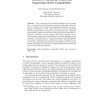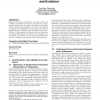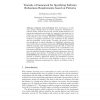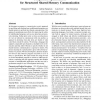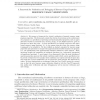152
click to vote
ECEASST
2010
14 years 9 months ago
2010
The ever-growing use of modeling languages today is largely due to a maturation of model-based development technologies. However, there is enough room for improving language specif...
126
click to vote
IGPL
2010
14 years 11 months ago
2010
Multi-agent systems where the agents are developed by parties with competing interests, and where there is no access to an agent's internal state, are often classified as `ope...
126
click to vote
FIW
2009
14 years 12 months ago
2009
Abstract. We explore and discuss different ways of expressing service specifications in the context of home automation systems implemented on OSGiTM. We found that the approach use...
158
click to vote
DLT
2009
14 years 12 months ago
2009
Abstract. Temporal logics are a well investigated formalism for the specification and verification of reactive systems. Using formal verification techniques, we can ensure the corr...
127
click to vote
CDC
2009
IEEE
14 years 12 months ago
2009
IEEE
Abstract-- We consider the problem of controlling a discretetime piecewise affine (PWA) system from a specification given as a Linear Temporal Logic (LTL) formula over linear predi...
116
click to vote
SIGSOFT
2010
ACM
14 years 12 months ago
2010
ACM
Keeping requirements specification up-to-date during the evolution of a software system is an expensive task. Consequently, specifications are usually not updated and rapidly beco...
143
click to vote
REFSQ
2010
Springer
14 years 12 months ago
2010
Springer
Abstract. [Context and motivation] With increasing use of software, quality attributes grow in relative importance. Robustness is a software quality attribute that has not received...
160
click to vote
OOPSLA
2010
Springer
14 years 12 months ago
2010
Springer
In this paper we propose a communication-centric approach to specifying and checking how multithreaded programs use shared memory to perform inter-thread communication. Our approa...
139
click to vote
ICLP
2010
Springer
2010
Springer
A Framework for Verification and Debugging of Resource Usage Properties: Resource Usage Verification
15 years 1 days ago
We present a framework for (static) verification of general resource usage program properties. The framework extends the criteria of correctness as the conformance of a program to ...
109
click to vote
COMPSAC
2010
IEEE
15 years 3 days ago
2010
IEEE
We present a pattern-based method to express time specifications in the language TLA+ . A real-time module RealTimeNew is introduced to encapsulate the definitions of commonly used...
